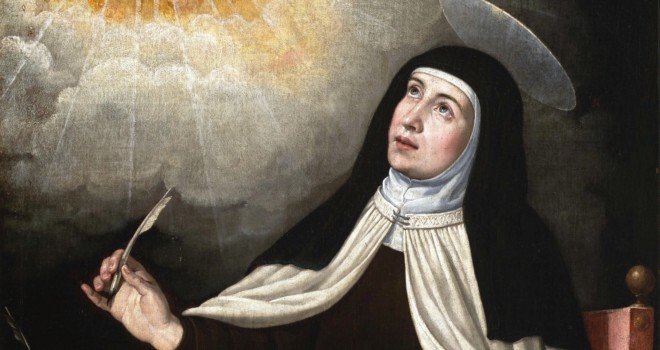October 15 in Christian History.

On October 15, Catholics commemorate the life and work of Teresa of Avila, the 16th century nun who revitalized the monastic tradition and redefined the essence of devotion to God.
When Teresa was seven years old, she ran away from her home in Avila, Spain, and headed for North Africa. She wanted to be martyred by the Muslim Moors in order to be with God.
Her enthusiastic devotion prompted her to become a nun, and at the age of eighteen she entered a Carmelite convent. She was surprised by the lax attitude and corruption rampant in the convent. She found that this environment only hindered a life of prayer.
Shortly after becoming a nun, Teresa experienced an intense bout with malaria. This sickness left her in agony for a long period. However, she began to experience visions of God and developed a deep sense of inner peace. As she recovered, she committed herself more intensely to constant prayer; her visions continued and she cultivated a deep relationship with God.

Unfortunately for Teresa, the reformation movement in the north had led to stricter standards of religious conformity within Catholic territories. The dreaded Spanish Inquisition sought to silence anyone who’s views threatened the status quo.
Teresa was forced to cease her practice to avoid persecution, as certain clergy assumed her visions to be delusions from the devil. It wasn’t till the age of 41 when, under the urging of a priest, she returned to her meditation. Once more she experienced frequent visions and cultivated a closeness with God.
Despite fierce opposition, Teresa opened her own convent in 1562. Her teachings gained popularity, and with the help of Saint John of the Cross, she founded 32 reformed convents. Her nuns became known as the Discalced, or bare foot, Carmelites, and hundreds of convents of the order remain today.

She reacted against many of the same injustices that Martin Luther had objected to. Like him, she despised empty religiosity and taught of a personal relationship with God. She was a controversial figure who wasn’t afraid to challenge the church where she saw corruption.
Her writings spawned the mystic movement in the Catholic church—a movement that centered around deep personal devotion rather than social piety and outward liturgy. Her poems, like this one, remain popular:
Let nothing affright thee,
Nothing dismay thee.
All is passing,
God ever remains.
Patience obtains all.
Whoever possesses God
Cannot lack anything
God alone suffices.
She was canonized in 1622, and in 1970 became the first woman to be named a doctor of the church—the highest honour that the Catholic church can give.
Verse of the day: Deuteronomy 6:4
Love the LORD your God with all your heart, with all your soul, and with all your strength.
This doesn't belong in Christianity. Catholicism needs its own category.
She's a heretic. Her writings about the ascent of the soul are unbiblical.
We're saved by faith alone in Christ alone guided by the Bible alone. We're not saved by infant baptism, obedience to church rules, and good works.
The pope isn't Christ's representative. He has no authority to interpret scripture or to condemn anyone to hell or to tell God who's a saint or what their job in Heaven will be.
Thanks for the comment and thanks for reading. I'm not a catholic myself and the majority of my posts are not about Catholicism. Having said that, I have little doubt that Teresa of Avila was a true Christian and while I do not agree with all of her teachings, I think there is a great deal that we can learn from her.
The purpose of these posts is to highlight the people and events that shaped Christianity throughout history. Teresa of Avila had a massive impact. Overall, I would say that she had a positive impact. If we are open minded, we can certainly glean some measure of truth and inspiration from her life.
You're right. The ascent of the soul is a bit weird. Thanks for calling that out. I don't stand by everything she taught.